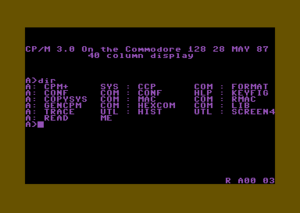CP/M
| CP/M | ||
|---|---|---|

| ||
| Developer | Gary Kildall | |
| Company | Digital Research, Inc. | |
| Publisher | Digital Research, Inc. | |
| Release | 1982 | |
| Licence | Originally proprietary, now BSD-like | |
| Platform |
| |
| Genre | Command line | |
| Operation | ||
| Media | ||
| Language(s) | ||
| Information | CP/M source code under open source license. | |
The CP/M operating system for PCs was conceived by G.Kildall at Digital Research in 1976. CP/M stands for Control Program for Microcomputers and was developed for a number of 8-Bit CPUs including the Intel 8080 and 8085 as well as the Z80 from Zilog. A ported version for the Intel 16-bit microprocessors 8086 and 8088 was produced, called CP/M 86. CP/M was widely used in the 1970s and 1980s, until it was eventually replaced by its competitors IBM- and MS-DOS. There are many different versions of CP/M: In 1988 CP/M ran on about 250 different computer systems.
The following programming languages are able to be run on CP/M:
- Cobol
- PL/1
- Algol
- Fortran
- BASIC
- CBASIC
- MBASIC includes Compiler, Interpreter, macro Assembler M80, Linker L80, library utility program LIB80. It is compatible with BASIC V2, GW-BASIC on MS-DOS and AmigaBASIC
- C
- BDS-C (mainly prevalent in the U.S.A)
- C80
- SMALL C (public domain)
- Forth
- FORTH83 (public domain; SIG/M Nr.204)
- Pascal
- Turbo Pascal
- Nevada Pascal
- JRT Pascal (public domain; SIG/M Nr.82 ) with linker, assembler, debugger, utility programs
CP/M consist of three big modules: CCP, BIOS and BDOS.
CP/M commands, respectively internal software:
- RMAC invocation of the macro assembler
- LINK linker of the macro assembler
- LIB assembler librarian LIB.COM
- DIR directory listing of a diskette
- PIP diskette copy program
- SUBMIT batch processor
- ED line-based text editor
There's a great variety of software for CP/M, such as dBASE II, Wordstar and Multiplan.
Links[edit | edit source]
| Wikipedia: CP/M |
| Wikipedia: Gary_Kildall |